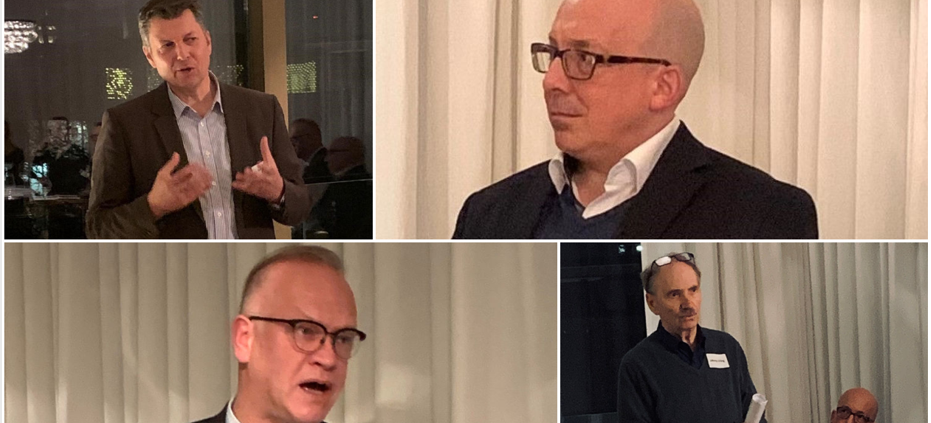XXXVIII Berlin Global Forum
Berlin, Germany
January 16, 2020
As a follow-up to our XV Study Trip to China & Hong Kong we organized another Global Forum on China for our members. Thanks to our large network and our longstanding relationships in China, we were able to assemble a high-ranking panel for the evening, including: Wolfgang Niedermark, Head of German Chamber of Commerce in Hong Kong, Johnny Erling, lived in China for over 40 years and worked as China correspondent for German newspapers (i.e. Die Welt) for 22 years, and Robert von Rimscha, German Consul General in Chengdu until October 2019. Veit Etzold, Global Bridges member, professional storyteller and author, guided us through the evening.
As an acknowledged Hong Kong expert, Wolfgang Niedermark perceives the city as a political and social volcano that erupts with persistent regularity. Nevertheless, the eruption in 2019 came as a surprise to all observers, which caused concern both in society and the business community. Even though people in Hong Kong enjoy civil rights, frustration with the government and persistent inequality are spreading, Niedermark says. Fear of the Communist Party’s (CP) control over all areas of life has also poisoned the climate in the city. For the moment it is quiet, but Hong Kong’s future remains uncertain, says Wolfgang Niedermark. At the same time, he is certain that Beijing has no interest in “wantonly destroying” Hong Kong, as it is still too important for China’s capital movements, especially as long as Shanghai cannot fulfil this role.
With 22 years of experience as China correspondent for German newspapers, Johnny Erling was able to give our members a multi-faceted look behind the scenes of Chinese politics and make current and fundamental issues tangible. In concrete terms, he used the example of the Belt and Road Initiative to make it clear that the “New Silk Road” is mainly beneficial to Chinese companies and does not contribute to the growth of the global economy. According to Erling, China is using the initiative to make geostrategically important states dependent on it through loans and development cooperation.
The former German Consul General of Chengdu, Robert von Rimscha, spoke of the city of Chongqing, comparing its economic development to that of the whole of China. Using the example of the severe slump in the automobile industry in Chongqing, he discussed the retreat of the population to the countryside and the associated supply problems as well as unemployment and welfare state problems. In addition, the slowdown in the growth of the Chinese economy is leading to the nationalization of private companies. Commenting on the Belt and Road Initiative, he said that “the idea of the Belt and Road Initiative is still alive and well and is still attracting investors”. At the same time, he emphasized that the EU should pay attention, as China tries to weaken the common European position through bilateral negotiations with individual EU-member states.
In the subsequent discussion round, our members used the opportunity to ask questions to the speakers. During the discussion, Johnny Erling made clear that China is not “closed to the world” and that it has drawn the right conclusions for its own economy from the collapse of the Soviet Union. He further mentioned that the perception of the Chinese economy in Germany is strongly influenced by a few hypermodern companies. In reality, however, China must be seen more as an “extended workbench”, said Robert von Rimscha. The question of whether Europe could learn from China when it comes to long-term planning was clearly answered by the panelists: China has a fundamentally different system than Europe, and the two systems are not compatible with each other.



